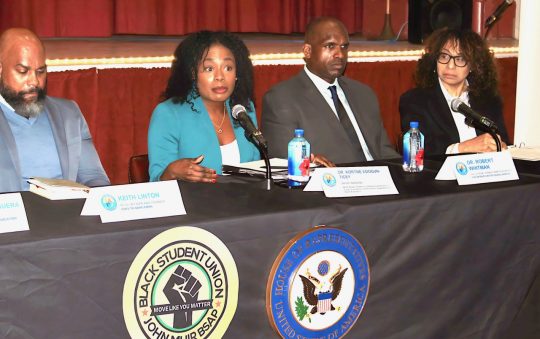
The tragic deaths of Ahmaud Arbery, Breonna Taylor, Rayshard Brooks, George Floyd, and others have illuminated, yet again, the realities of systemic violence Black Americans have faced for centuries and continue to encounter daily. Much of the current attention is focused on law enforcement. But our public education system has its own racialized history of oppression.
Right now, there are 50,000 Black students in LAUSD, a little over 8% of the total student body. The data on educational outcomes for these students tells a sad tale of systemic neglect and disenfranchisement. Last year, only 20% of Black students in L.A. were on grade level. Three in 10 met the state standards in math. Both figures lag far behind the rest of the district.
And Black students are well aware that the system is stacked against them. According to a recent district survey, over half of Black high schoolers in South L.A. said they did not feel that students are treated fairly. Their experiences are supported by research; 2017 state data shows that Black students were suspended at four times the rate of their White peers.
These numbers should be shocking. But they are in line with years of citywide data to which we have become numb. For instance, in 2014, the first year California started using new standards, 25% of Black students in L.A. Unified read at grade level, while 15% of Black students met California math standards.
How do we as a community confront the ongoing harm imposed upon Black children and teens through our education system? How can we build a future in which every Black student can reach his or her fullest potential, especially in the midst of a pandemic where so many students have lost important learning time because of limited access to high speed internet and the while also grappling with inadequate access to technology?
We should look first at the pockets of success within LAUSD. Those achievements can help guide the District forward.

At Baldwin Hills Elementary School, the student body is nearly 80% African American, and in 2015 the school staff, led by their principal, Letitia Johnson-Davis, made a commitment to creating a curriculum that was tailored to ensuring Black students succeed. This meant revamping their history lessons and using poetry to teach English. As a result, student scores in English went up 62% between 2016 and 2018 while math scores increased by 27%.
A similar, intentional approach in South L.A. has also shown promising results.
This year, Innovate Public Schools published a report on Black student achievement within LAUSD that illuminated the on-going disparities in the quality of instruction provided to Black students. Additionally, Innovate parent leaders brought their demands for higher quality instruction directly to LAUSD, which resulted in District officials starting a 10 week pilot program designed to help Black elementary students improve in math. Many parents whose children participated said they felt like their concerns were being addressed by the instructors.
Prior to their participation in the pilot parents had been told their children would not listen to teachers, had difficulty learning the material or didn’t like going to class. But during the pilot, their children were engaged and those issues were no longer raised.
The results of this small pilot show the promise of what can happen if Black children receive instruction that honors their brilliance and ability. The program flew under the radar, in part because it concluded shortly before stay-at-home orders were issued, but LAUSD could expand the pilot and use its structure as a way to engage students in the near future.
We cannot let the momentum gained in schools like Baldwin Hills Elementary School or in the South L.A. pilot program fade away during the pandemic. As a city, we must continue to craft and fund strategies that center on the success of Black students.
The LAUSD School Board recently voted to cut the district’s school police budget by $25 million and to use that funding “to support African American student achievement.” This reallocation is only the beginning of what we should do for our Black students and families. Our goal as a city should not be to simply support Black students, but to obliterate the achievement gap. This will take funding and political will.
The school board took the right first step. It’s up to all of us to ensure it’s not the last. In the short term, it is paramount that LAUSD articulates how it will specifically support Black student learning during this pandemic. Then in alignment with those supports, it must implement effective distance learning. Our city and the 50,000 Black students in L.A. Unified deserve nothing less.
Ponce is the Executive Director of Great Public Schools Now. Lawson is President and CEO of the Los Angeles Urban League.






